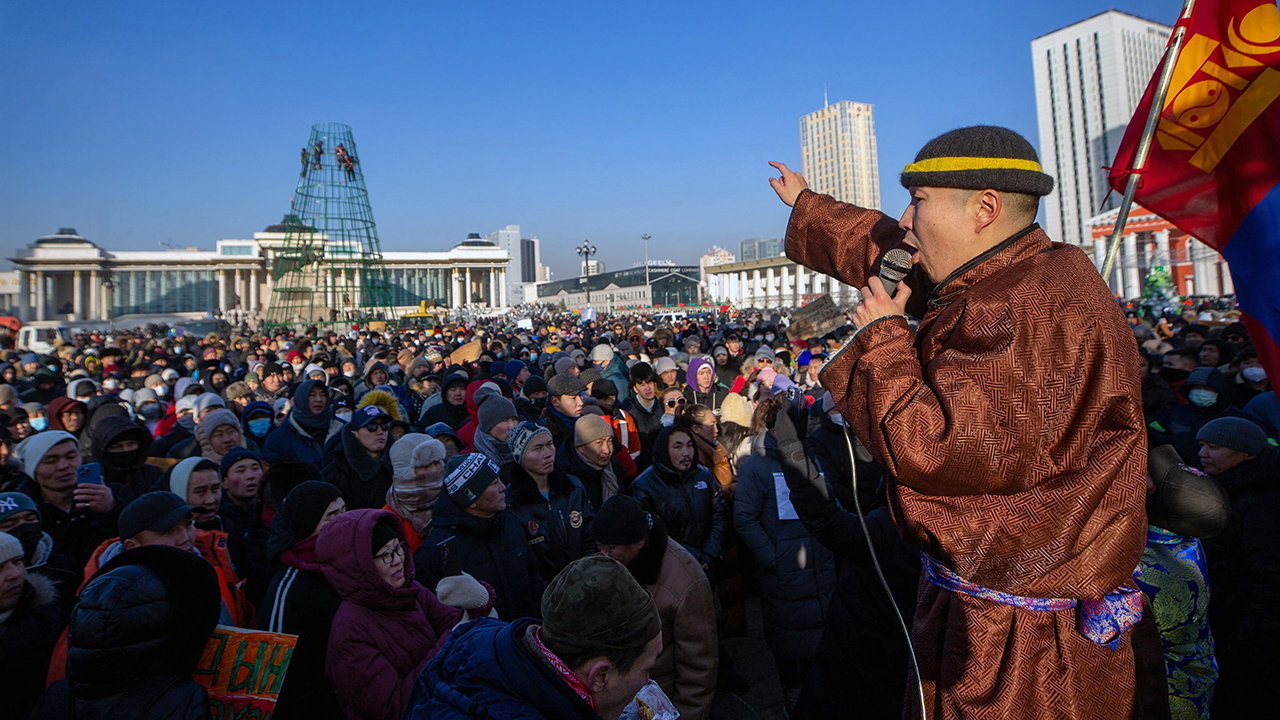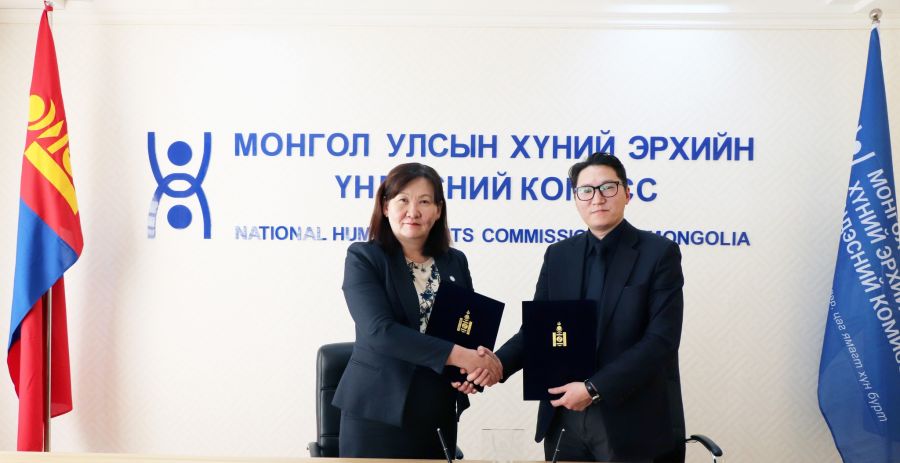Mongolia’s Escalating Corruption Under Human Rights Committee’s Scrutiny
Published on 13 Mar 2025, 10:45 AM
The Human Rights Committee reviewed Mongolia during its 143rd session in March 2025
 Protest against corruption in the coal industry in Ulaanbaatar, Mongolia, on December 8, 2022. BY Ambasuren Byamba-Ochir/ AFP
Protest against corruption in the coal industry in Ulaanbaatar, Mongolia, on December 8, 2022. BY Ambasuren Byamba-Ochir/ AFP
On March 10 and 11, 2025, the Human Rights Committee reviewed Mongolia’s seventh periodic report under the International Covenant on Civil and Political Rights (ICCPR) in Geneva, Switzerland. The Mongolian delegation, which brought Mongolian interpretation, was led by State Secretary of the Ministry of Justice, Mr. Miyagma. The delegation presented several legal and policy reforms but faced intensive questioning from Committee experts on the most pressing human rights challenges.
During the dialogue, Committee members welcomed Mongolia’s openness but emphasized that concrete action is needed to move from law to practice. The Mongolian delegation reiterated its commitment to strengthening human rights protections, acknowledging that while legal frameworks have improved, enforcement and implementation remain a work in progress.
Worsening Corruption and Anti-Corruption Measures
The Committee repeatedly questioned Mongolia about widespread and deeply rooted corruption, particularly high-level political corruption cases. Although Mongolia has introduced new anti-corruption laws and tougher sanctions, the Committee expressed skepticism over the lack of systematic enforcement and effective prosecutions. The coal corruption scandal was pointed to as an example of lacking transparency of investigations and accountability for senior officials implicated in the case.
In response, the Mongolian delegation highlighted recent criminal code amendments, increased judicial budgets, and improvements in judicial independence. The delegation emphasized that corruption cases are increasingly being prosecuted, citing statistics showing a rise in convictions, and noted that a whistleblower protection law is under preparation for submission to Parliament within 2025. However, Mongolian officials also acknowledged challenges in the full implementation of anti-corruption measures.
National Human Rights Commission: Independence and Power Under Scrutiny

The Committee devoted substantial attention to the National Human Rights Commission of Mongolia (NHRCM), questioning whether it has sufficient independence and authority to investigate human rights abuses effectively. A major point of concern was article 22.2 of the NHRCM law, which bars the Commission from investigating ongoing legal cases, limiting its capacity to address urgent violations. The selection process of NHRCM commissioners was another source of concern as undermining the body’s independence.
The Mongolian delegation defended the NHRCM, stressing that it is fully independent under national law and that its budget and staff have been significantly increased to meet its growing mandate. They confirmed that commissioners are appointed through a public parliamentary process and that recommendations made by the NHRCM are binding on State officials. Nonetheless, Mongolia acknowledged the Committee’s concerns and committed to reviewing the legal limitations on NHRCM’s mandate, including considering amendments to Article 22.2 by 2028.
Human Trafficking and Forced Labor: A Call to Strengthen Protections for Victims
The Committee raised alarm over persistent cases of trafficking in persons, forced labor, and child exploitation, especially in mining, coal transport, and horse racing industries. Members were particularly concerned about low rates of prosecution and conviction for trafficking offenses and the criminalization of victims for acts committed under duress. Other major concerns include the lack of identification and support for male and child trafficking victims, as well as insufficient State funding for victim services, which currently rely heavily on NGOs.
In response, Mongolia acknowledged the ongoing challenges but highlighted efforts to improve, including new victim identification guidelines, forensic interview methods, and plans to increase the number of labor inspectors. Officials also stated that Mongolia is working toward increasing state funding for shelters and victim support services, although they admitted that these services currently depend on NGO partnerships.
Watch the review session again here (Day 1) and here (Day 2).
Disclaimer: Transcripts of the dialogue available here powered by WIPO Speech-to-Text served as the main source of the presented article. While all the information was carefully checked, please refer to the audio or UN WebTV for an official version of the dialogue.
Recommendations of the Human Rights Committee
The Concluding Observations on Mongolia’s seventh periodic report were released on 28th March 2025. The State party is requested to provide, by 28th March 2028, information on the following recommendations:
National human rights institution
The State Party should:
The State Party should consider revising the Law on the National Human Rights Commission of Mongolia to clarify the Commission’s jurisdiction over complaints relating to alleged procedural rights violations in active or concluded criminal or civil cases. The State party should also take appropriate measures to enhance diversity and pluralism in the composition of the Commission and its Civil Society Council, for instance, by ensuring broad public awareness of vacancies, including among ethnic and minority groups.
Anti-corruption measures
The State Party should:
(a) Effectively enforce anti-corruption legislation, including by taking appropriate measures to strengthen the independence and effectiveness of the Independent Authority Against Corruption (IAAC);
(b) Ensure that all allegations of corruption are promptly, thoroughly and impartially investigated and that perpetrators are prosecuted and, if convicted, sanctioned with penalties commensurate with the gravity of the crime; and prioritise the investigation and prosecution of high-level corruption by politicians and public officials;
(c) Provide effective training to law enforcement officials, prosecutors and judges on detecting, investigating and prosecuting corruption and related offences;
(d) Ensure the effective protection of whistle-blowers and witnesses, including through the adoption of legislation and the establishment of protection mechanisms,
(e) Ensure that procedural decisions and the main outcomes of high-level or high-profile corruption cases are explained to the public through appropriate public information measures.
Freedom of expression
The State Party should:
(a) Protect journalists, media workers and human rights defenders from harassment and intimidation, promptly investigate all such acts and bring those responsible to justice ensuring they receive adequate punishment;
(b) Review and revise its current and pending legislation, including the Criminal Code and the draft laws on media freedom and access to information, to avoid the use of vague terminology and overly broad restrictions that are incompatible with article 19(3), notably with regard to provisions on the dissemination of false information;
(c) Ensure that the right of access to information held by public bodies can be effectively exercised in practice and proactively put in the public domain government information of public interest;
(d) Take measures to protect the editorial independence of media outlets from political influence, including by ensuring the transparency of private media ownership.
Here, you can find all the recommendations given by the Committee in the Concluding Observations.
The follow-up report of Mongolia on the implementation of recommendations is due in 2028. The next list of issues will be adopted in 2031, and the next periodic report is due in 2033.
 Protest against corruption in the coal industry in Ulaanbaatar, Mongolia, on December 8, 2022. BY Ambasuren Byamba-Ochir/ AFP
Protest against corruption in the coal industry in Ulaanbaatar, Mongolia, on December 8, 2022. BY Ambasuren Byamba-Ochir/ AFP


